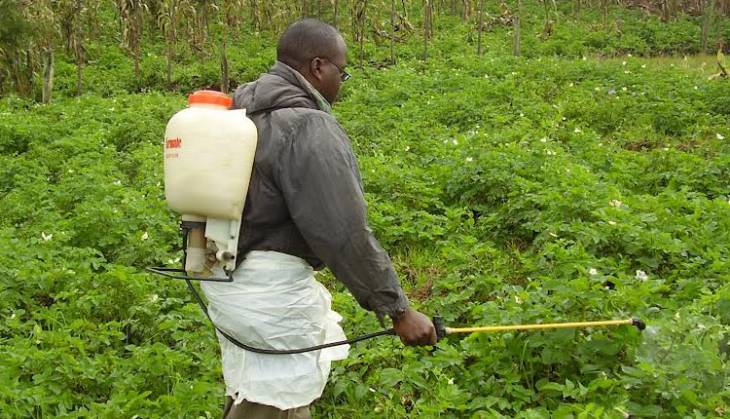Farmers welcome new seed potato producing technology

A new seed potato producing technology recently introduced in the country, known as apical rooted cuttings is promising to provide a viable alternative to mini-tubers and accelerate high quality seed production for farmers.
Cuttings are similar to nursery grown seedlings. They are produced from tissue culture plantlets in a screenhouse and then the plantlets are then taken to the fields of seed producers or local farmers to plant them and produce a high quality number of seed tubers.
“One of these tissue culture plantlets can produce over 100 cuttings, which in turn can result in 1,000 to 2,000 first generation tubers that become starter material for successful generation of seed in the field,” observed Dr Monica Parker, a senior scientist at the International Potato Centre (CIP), which brought the technology to Kenya through the Feed the Future – Kenya Accelerated Value Chain Development programme of the United States Agency for International Development.
In Kenya, CIP is partnering with Farm Input Promotions Africa (FIPs), and county governments of Kiambu, Nakuru, Uasin Gishu and Meru to scale out this work.
High returns
Private companies are now producing and selling apical cuttings to seed businesses to make certified seed, and to farmers and farmer groups to produce their own seed, according to CIP.

Large- and small-scale nurseries sold 390,000 and 586,000 cuttings in Kenya in 2019 and 2020, respectively.
“This technology has given very high returns for farmers who buy the cuttings- in terms of seed quantity and quality,” observed Cecinta Nduru, a Kenyan farmer who is in a growing list of small-scale seed ‘multipliers’ who produce seeds using the new technology.
The researchers at CIP say high productivity at the first stage of seed production means that commercial seed can be sold after two seasons of multiplication.
Opportunity for farmers
With high quality seed available for farmers after a few field generations of multiplication, seed produced from apical cuttings can be saved on-farm for later seasons without significant risk of quality loss.
“Apical cuttings offer opportunities for seed production in areas with insufficient land for traditional seed bulking and crop rotation and accelerate disseminating novel varieties,” observed Dr Parker.
Apical cuttings have already been included in Kenya’s national potato certification protocol.
Potato is among the three most important food security crops and cash crops in Kenya and grown across many counties notably Nyandarua, Narok, Meru and Trans Nzoia counties.
The sub-sector employs over 2.5 million people along the value chain with an estimated annual worth of U$480 million (Sh54.4 billion).
Over 60 per cent of fresh potatoes are sold through fast-food outlets or market stalls. Chips and crisps are a favourite delicacy in urban centres.
However, farm incomes in Kenya and other African countries remain low, hindered mainly by low yields of eight to15 tonnes (15,000 kilogrammes) per 2.5 acres, which is about half of expected yields with better inputs and practices, according to experts.
“Our major challenge as potato farmers remains quality seeds, pests and diseases and finally low farm gate prices, making growing of the crop increasingly unattractive, especially to younger farmers,” observed David Njuguna, a potato farmer in Ngano Village, overlooking Nyandundo Hill in Nyandarua County.
Like many farmers in Nyandarua, Njuguna has witnessed declining interest in potato farming in the area mainly due to low quality seeds, high costs of production, low yields and returns.
“Limited access to clean planting material is a major barrier to increasing productivity.
Most potato farmers in Africa plant poor quality seed, which they save from the previous harvest or purchase from unregulated local markets,” he said.
Disease resistant
Often infected with disease, this seed potato performs poorly. Beyond CIP, local research organisations have also been active in seeking technologies that can help farmers develop seed potatoes.
The Kenya Agricultural and Livestock Research Organisation (Kalro) has in the recent past developed another technology for developing potato seeds.
Known as potato aeroponics, the technology uses a soil-less box where newly developed tissue culture plantlets are raised to produce potato seeds.
Thus, expanding farmer access to quality seed of improved potato varieties is essential to boosting yields and earnings.
“Blight is the biggest threat to potato farming. Our production would be much higher were it not for this menace that tends to attack during humid weather.
It can wipe out the whole crop”, notes Samuel Kamau, a farmer in Shamata, Nyandarua district.











